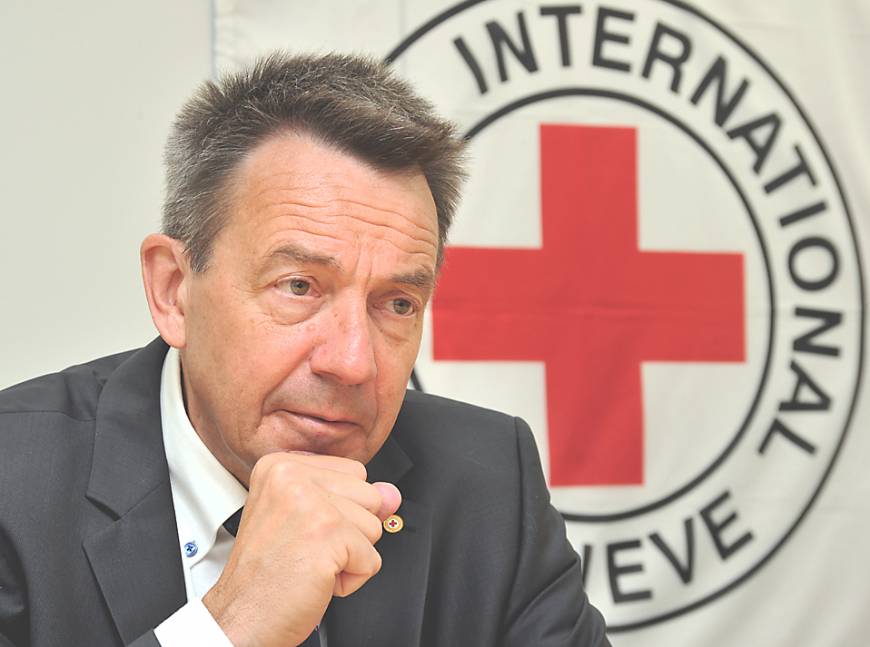|
Getting your Trinity Audio player ready…
|
By Baboloki Semele
Gaborone, Botswana – The warning lights are flashing on high: armed conflict, climate-related emergencies, economic hardship and political obstacles are leading to a growing wave of hunger in countries around the world. The misery for millions will deepen without immediate urgent action, warns the International Federation of Red Cross and Red Crescent (IFRC).
This publication received a press statement from the federation, and in the process learnt that as hunger emergencies hit the headlines, the risk of crisis fatigue is high. Yet what’s uniquely frightening about this moment is the breadth and depth of the needs as more than 140 million people face acute food insecurity due to conflict and instability, even as climate change and economic precarity indicate that hunger needs will rise in the coming months.
According to the release, Francesco Rocca, President of the IFRC, highlighted that two dozen countries across Africa are grappling with the worst food crisis in decades. Some 22 million people in the Horn of Africa are in the clutches of starvation due to such compounding crises as drought, flooding, COVID-19’s economic effects, conflict – even desert locusts, and behind the staggeringly high numbers are real people – men, women and children battling death-level hunger every day and the situation is expected to deteriorate into 2023.
Rocca says, however, with swift action, many lives can be saved. He noted that urgent and massive action is needed to scale up life-saving assistance to millions of people in dire need of aid, but also to decisively address the root causes of this crisis through longer-term commitments.
The IFRC and its membership—which consists of Red Cross and Red Crescent teams in nearly every corner of the globe—are delivering aid in hard-to-reach communities. Assistance includes getting cash into the hands of families to meet food, health and other urgent needs. In Nigeria, Red Cross volunteers focus on pregnant and breastfeeding mothers, whose nutrition is paramount for healthy births and childhoods.
In Madagascar, volunteers restore land and water sources through anti-erosion activities, the construction of water points, and a focus on irrigation in addition to traditional ways to fight hunger, like nutrition monitoring.
The press statement further quotes Peter Maurer, President of the International Committee of the Red Cross (ICRC), who said conflict is a huge driver of hunger.

“We see violence preventing farmers from planting and harvesting. We see sanctions and blockades preventing food delivery to the most vulnerable. My wish is that we build resiliency into the fabric of humanitarian response so that communities suffer less when violence and climate change upend lives. A cycle of band-aid solutions will not be enough in coming years,” he added.
The ICRC this year has helped nearly 1 million people in south and central Somalia with a month’s worth of food by distributing cash to more than 150,000 households.
A similar programme in Nigeria helped 675,000 people, while more than a quarter million people received climate-smart agriculture inputs to restore crop production. The ICRC works to strengthen resilience through seeds, tools and livestock care so that residents can better absorb recurrent shocks. And its medical professionals are running stabilization centres in places like Somalia, where kids are getting specialized nutrition care.
Communities around the world, with Africa hardly hit, are suffering. In Sub-Saharan Africa, one in three children under the age of five is stunted by chronic undernutrition, while two out of five women of childbearing age are anaemic because of poor diets. The majority of people in sub-Saharan Africa live on less than $1.90 a day.
This statement comes at a time and a year when Africa is pushing for the implementation of nutrition of food and nutrition services. As part of the long-term vision set out in Agenda 2063, the Assembly of Heads of State and Government of the African Union has adopted common African aspirations, drawing on the potential of its populations, in particular, a human capital well-nourished citizens and good health with a particular emphasis on women, adolescents and children.
Africa was estimated to have a population of 1.25 billion in 2018 and is the fastest urbanizing continent, with a growth rate of more than 2.6 percent. The large youth population presents a potential demographic dividend that, if adequately leveraged with the right investments, could contribute to accelerating sustainable and equitable development.
Over the years, under-5 mortality has reduced by more than 50 percent between 1994 to 2019; fertility rates have declined from 6 to 4 children per woman.
However, compared to the rest of the world, malnutrition remains high on the continent and undernutrition is particularly an underlying cause of almost half of child deaths. At the beginning of this year, the General Assembly of Heads of State and Government set aside 2022 as the year of Nutrition under the theme “Strengthening Resilience in Nutrition and Food Security on the African Continent: Strengthening Agro-Food Systems, Health and Social Protection Systems for the Acceleration of Human, Social and Economic Capital Development” with particular emphasis to secure greater political commitment and investment in nutrition to address the ongoing nutrition challenges.
The move saw countries like Botswana launching the Year of nutrition and aligning food and nutrition services policies with those of the African Union.
On a different but close issue, the Capital of Ethiopia, Addis Ababa is bracing to host the commemoration of the 13th Africa Day for Food and Nutrition Security (ADFNS) to be held on 31 Oct to 01 Nov 2022 at the African Union Commission Headquarters.
The theme of the event to be held in hybrid format is aligned with the 2022 AU theme, and summed up as “Action towards Eradicating Malnutrition and Poverty: An Integrated Approach for Resilient Food, Health and Social Protection Systems”.
The overarching objective of commemorating the 13th ADFNS is to seize the opportunity of the 2022 Year of Resilience in Nutrition and Food Security to consolidate action, increase the momentum and influence policy commitments towards enhancing resilience to shocks and stressors that burden Africa through bringing into synergy agro-food systems, health, human capital and socio-economic development.
And the expectation is that these meetings will produce tangible results for the betterment of the livelihoods of Africans. Systems-level improvements must be made to escape a cycle of recurrent crises, including investments in climate-smart food production in conflict-affected areas, and reliable mechanisms to support hard-to-reach communities hit by food shortages and skyrocketing prices
